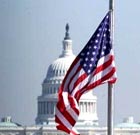| In preparation for oral arguments Tuesday on the extent of gun rights guaranteed by the Second Amendment, the U.S. Supreme Court has before it a brief signed by Vice President Cheney opposing the Bush administration's stance. Even more remarkably, Cheney is faithfully reflecting the views of President Bush. The government position filed with the Supreme Court by U.S. Solicitor General Paul Clement stunned gun advocates by opposing the breadth of an appellate court's affirmation of individual ownership rights. The Justice Department, not the vice president, is out of order. But if Bush agrees with Cheney, why did the president not simply order Clement to revise his brief? The answers: disorganization and weakness in the eighth year of his presidency. Consequently, a Republican administration finds itself aligned against the most popular tenet of social conservatism: gun rights, which enjoy much wider agreement than do opposition to abortion or gay marriage. Promises in two presidential campaigns are being abandoned, and Bush finds himself to the left of even Democratic presidential candidate Sen. Barack Obama. The 1976 D.C. statute prohibiting ownership of all functional firearms was called unconstitutional a year ago in an opinion by Senior Judge Laurence Silberman, a conservative who has served on the U.S. Court of Appeals for the D.C. Circuit for 22 years. It was assumed that Bush would fight Mayor Adrian Fenty's appeal. The president and his senior staff were stunned to learn, on the day it was issued, that Clement's petition called on the high court to return the case to the appeals court. The solicitor general argued that Silberman's opinion supporting individual gun rights was so broad that it would endanger federal gun control laws such as the bar on owning machine guns. The president could have ordered a revised brief by Clement. But facing congressional Democratic pressure to keep his hands off the Justice Department, Bush did not act. Cheney did join 55 senators and 250 House members in signing a brief supporting the Silberman ruling. Although this unprecedented vice presidential intervention was widely interpreted as a dramatic breakaway from the White House, longtime associates could not believe that Cheney would defy the president. In fact, he did not. Bush approved what Cheney did in his constitutional role as president of the Senate. That has not lessened puzzlement over Clement, a 41-year-old conservative Washington lawyer who clerked for Silberman and later for Supreme Court Justice Antonin Scalia. Clement has tried to explain his course to the White House by claiming that he feared Justice Anthony Kennedy, the Supreme Court's current swing vote, would join a liberal majority on gun rights if forced to rule on Silberman's opinion. The more plausible explanation for Clement's stance is that he could not resist opposition to individual gun rights by career lawyers in the Justice Department's Criminal Division (who clashed with the Office of Legal Counsel in a heated internal struggle). Newly installed Attorney General Michael Mukasey, a neophyte at Justice, was unaware of the conflict and learned about Clement's position only after it had been locked in. A majority of both houses in the Democratic-controlled Congress are on record as being against the District's gun prohibition. So are 31 states, with only five (New York, Massachusetts, Maryland, New Jersey and Hawaii) in support. Sen. Barack Obama has weighed in against the D.C. law, asserting that the Constitution confers an individual right to bear arms -- not just collective authority to form militias. This popular support for gun rights is not reflected by an advantage in the oral arguments to take place Tuesday. Former solicitor general Walter Dellinger, an old hand at arguing before the Supreme Court, will make the case for the gun prohibition. Opposing counsel Alan Gura, making his first appearance before the high court, does not have the confidence of gun-ownership advocates (who tried to replace him with former solicitor general Ted Olson). The cause needs help from Clement during his 15-minute oral argument, but it won't get it if he reiterates his written brief. The word was passed in government circles this week that Clement would amend his position when he actually faces the justices -- which would be an odd ending to bizarre behavior by the Justice Department. |





